United Nations (UN) is an international organization that works for world peace and security, and for better living standards and human rights for all people of the world. Almost all of the world’s independent countries belong to the UN. Each member nation sends representatives to UN Headquarters in New York City, where they discuss and try to solve problems.
The United Nations has two main goals: peace and human dignity. If fighting between two or more countries breaks out anywhere, the UN may be asked to try to stop it. After the fighting stops, the UN may help work out ways to keep it from starting again. But the UN tries above all to deal with problems and disputes before they lead to fighting. It seeks the causes of war and tries to find ways to eliminate them.
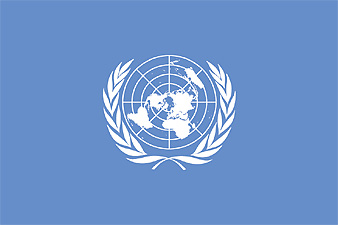
The United Nations has met with both success and failure in its work. It has been able to keep some disputes from developing into major wars. The organization has also helped people in numerous parts of the world gain their freedom and better their way of life. The UN works to defend human rights and to provide aid for countries or groups of people in need around the world. For many years, however, disagreements among UN member nations prevented the organization from operating effectively. Since the mid-1980’s, greater cooperation among members has enabled the UN to attempt missions in more countries.
The United Nations was established on Oct. 24, 1945, shortly after World War II. As the war drew to an end, the nations that opposed Germany, Italy, and Japan decided that such a war must never happen again. Representatives of these nations met in San Francisco in April 1945 and worked out a plan for an organization to help keep world peace. This plan was described in a document called the Charter of the United Nations. In June 1945, 50 nations signed it. They were the first UN members. Since then, over 140 other nations have joined.
In some ways, the UN resembles the League of Nations, which was organized after World War I (see League of Nations). Many of the nations that founded the UN had also founded the League. Like the League, the UN was established to help keep peace between nations. The main organs of the UN are much like those of the League. But the UN differs from the League in two main ways. First, all the great military powers except Communist China were UN members from the beginning, and Communist China gained membership in 1971. By contrast, several powerful countries, including the United States, either did not join the League or withdrew from it. Second, the UN’s concern with economic and social problems gives it broader responsibilities than the League had.
The six major organs of the United Nations carry on the work of the organization. These organs are (1) General Assembly, (2) Security Council, (3) Secretariat, (4) Economic and Social Council, (5) International Court of Justice, and (6) Trusteeship Council. A variety of specialized agencies related to the UN deal with such problems as communications, food and agriculture, health, and labor.
UN Headquarters consist of several buildings along the East River in New York City. The three main buildings are the General Assembly Building, the Secretariat Building, and the Conference Building. The flags of all the members fly in front of UN Headquarters.
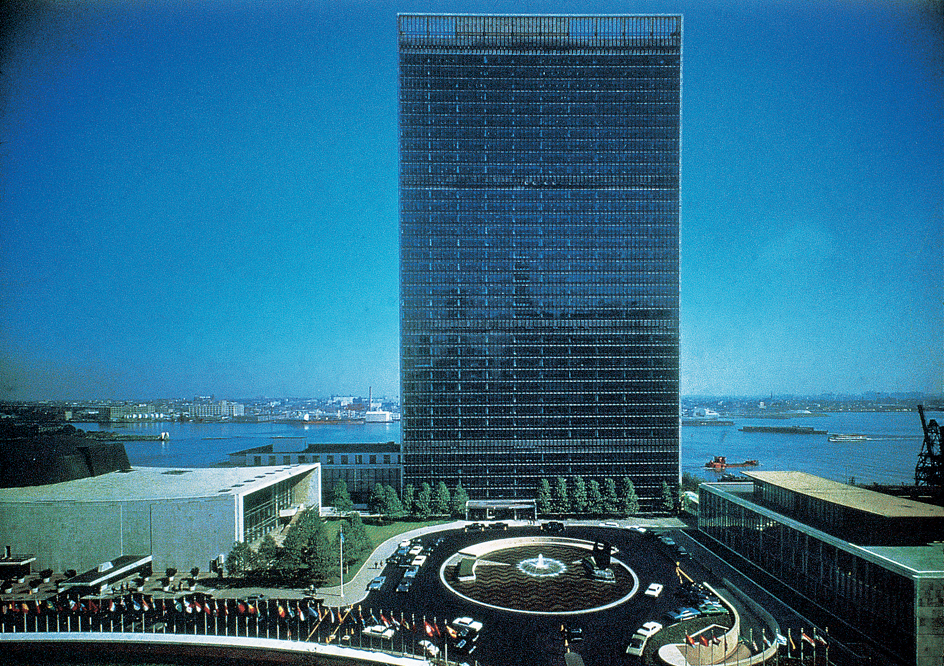
The charter
The Charter of the United Nations is the constitution of the UN. It includes the plan used for organizing the UN, and the rules by which the UN is governed. UN members agree to carry out the requirements of the charter. The charter has 19 chapters divided into 111 articles that explain the purposes (goals), principles (basic beliefs), and operating methods of the UN.
Purposes and principles.
The charter lists four purposes and seven principles of the United Nations. The first purpose is to preserve world peace and security. The second purpose is to encourage nations to be just in their actions toward each other. The third is to help nations cooperate in trying to solve their problems. The fourth purpose is to serve as an agency through which nations can work toward these goals.
The first principle of the United Nations is that all members have equal rights. Second, all members are expected to carry out their duties under the charter. Third, they agree to the principle of settling their disputes peacefully. Fourth, they agree not to use force or the threat of force against other nations, except in self-defense. Fifth, members agree to help the UN in every action it takes to carry out the purposes of the charter. Sixth, the UN agrees to act on the principle that nonmember states have the same duties as member states to preserve world peace and security. And seventh, the UN accepts the principle of not interfering in the actions of a member nation within its own borders. But the actions taken in the member’s own country must not hurt any other nation.
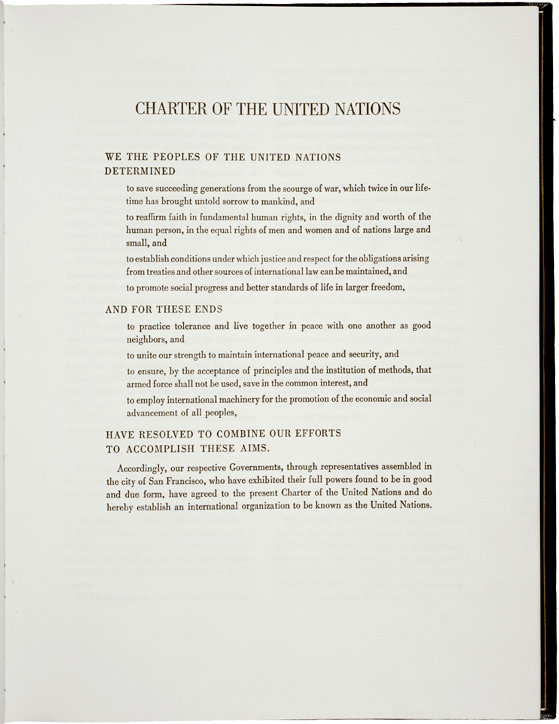
Membership requirements.
The first members of the United Nations were the nations that signed the charter in 1945. Since then, many other nations have requested to join the organization. The charter states that membership in the UN is open to all “peace-loving states” that are “able and willing” to carry out the duties required by the charter. Both the Security Council and the General Assembly must approve applications for membership. A member nation that violates the charter may be suspended or even expelled from the UN.
The six major UN organs.
The charter sets up the six main organs of the UN and explains the duties, powers, and operating methods of each. (1) The General Assembly is the only major organ in which all UN members are represented. The charter permits the Assembly to discuss any question of importance to the UN and to recommend action to be taken by the members or by other UN organs. (2) The Security Council has the major responsibility in the UN for keeping the peace. The charter gives the Council special powers to carry out this responsibility. (3) The Secretariat has the job of helping all the other organs do their work as efficiently as possible. (4) The charter gives the Economic and Social Council several duties, such as advancing human rights and helping people to better their way of life. (5) The International Court of Justice handles international legal disputes. (6) The charter established the Trusteeship Council to watch over and assist a number of small territories that were not self-governing at the time that the UN was founded.
The United Nations has established many other agencies, committees, and commissions since the charter was written. But the six main organs are the only UN bodies that operate under rules included in the charter.
Amending the charter.
The UN charter sets forth the rules for changing the charter. Amendments may be proposed in either of two ways. The General Assembly may propose an amendment if two-thirds of all its members agree to do so. Or two-thirds of the General Assembly members and any nine members of the Security Council may call a General Conference to discuss making changes in the charter. As in the General Assembly, a two-thirds vote of a General Conference is required to propose an amendment. A proposed amendment does not go into effect until it has been approved by two-thirds of all members of the United Nations, including the five permanent members of the Security Council.
The General Assembly
The General Assembly is the only major organ of the United Nations in which all members are represented. Each member may send five delegates, five alternate delegates, and as many advisers as it wishes. However, each member nation has only one vote.
The General Assembly elects a new president and a number of vice presidents at the beginning of each annual session. The president’s main duty is to lead the Assembly’s discussions and direct its work.
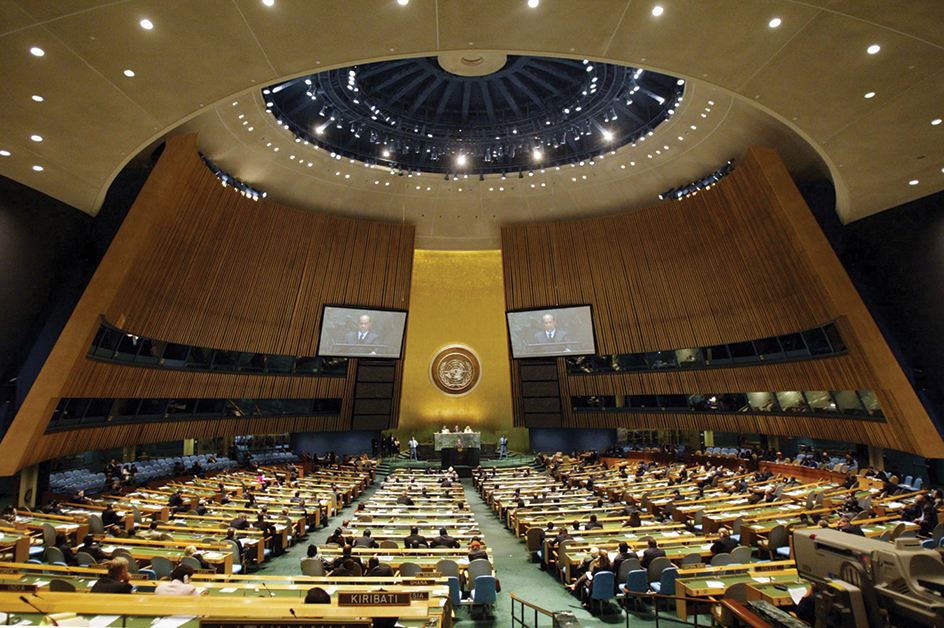
Powers.
The Assembly is responsible in some way for every other UN organ. It elects or takes part in electing the members of the other major organs, and it directs the operations of some UN bodies. The Assembly also controls the UN’s budget. It decides how much money each member should contribute and how much of the UN’s funds each UN body should receive.
The General Assembly may discuss any question that concerns the work of the UN. It reaches decisions through a vote of its members. As a result of such a vote, the Assembly may suggest actions to be taken by other UN bodies or by member nations. According to the charter, the only decisions of the General Assembly that UN members must obey are votes on the UN budget. All other decisions made by the General Assembly are simply recommendations.
The General Assembly’s responsibility for keeping the peace is second only to the similar responsibility of the Security Council. The kind of peacekeeping action that the Assembly can take has been strengthened since the charter was written. In the early years of the UN, sharp disagreements in the Security Council prevented the Council from acting in many cases. In 1950, the General Assembly approved a resolution (formal statement) called “Uniting for Peace.” This resolution gave the Assembly the power to step in whenever peace is threatened and the Security Council has failed to act. In such an emergency, the Assembly can recommend actions for the UN, including the use of armed force.
Meetings and voting.
The General Assembly holds one regular session each year, beginning on the third Tuesday in September and lasting about three months. A special session may be called if either the Security Council or a majority of member states requests it. Several special sessions have been called to discuss such matters as peacekeeping and finances. The “Uniting for Peace” resolution in 1950 set up a system for calling an emergency special session of the General Assembly. Such a meeting can be called on 24 hours’ notice if peace is threatened and the Security Council has not acted. Any nine members of the Security Council or a majority of UN members may call an emergency special session. Such sessions have been held for situations in the Middle East, Hungary, and other parts of the world.
In September 2000, the General Assembly held its 55th session, which it called the Millennium Assembly. Over 150 government leaders met at the UN Headquarters to discuss the role of the UN and the challenges it faces. The meeting was the largest gathering of world leaders ever assembled.
Most questions that are voted on in the General Assembly are decided by a simple majority vote. Some subjects that the charter calls “important questions” need a two-thirds majority vote. These topics include peace and security and the election of new UN members. A simple majority vote of the Assembly may also make any other question an “important” one.
Committees.
The UN Charter permits the Assembly to create as many committees as it needs to help carry on its work. The Assembly has set up main committees—the First, Second, Third, Fourth, Fifth, and Sixth committees. Every Assembly member—thus, every UN member—may have a representative on all these committees.
The First Committee discusses political and security questions and arms control. The Second Committee deals with economic and financial questions, the Third with social and cultural matters, and the Fourth with problems of countries that are not self-governing. The Fifth Committee handles administrative and budget matters, and the Sixth handles questions of law. Each committee studies problems assigned to it and makes recommendations to the Assembly.
The Security Council
The UN Charter makes the Security Council responsible for keeping the peace. Until 1965, the Council had 11 members. Since then, it has had 15 members, of which 5 are permanent. The permanent members are China, France, Russia, the United Kingdom, and the United States (see Big Five). Russia’s seat on the Council was held by the Soviet Union until 1991, when the Soviet Union broke apart. The 10 nonpermanent members of the Council are elected to two-year terms by the General Assembly. Each member of the Security Council has one delegate on the Council. Several nations of the UN support expanding the number of permanent Security Council members to reflect the UN’s global membership.
Powers.
The Security Council has the power to decide what action the UN should take to settle international disputes. The charter states that the Council’s decisions are made in the name of all UN members, who must accept them and carry them out. The Council encourages the peaceful settlement of disputes by calling on the opposing sides to work out a solution. Or the Council may ask the sides to accept a settlement worked out by other nations, individuals, or groups.
The Council itself may investigate a dispute and suggest ways of settling it. For example, the Council may call on UN members to stop trading with a country that is endangering peace and security. It may also ask the members to cut off communications with such a state, or to end contacts with its government. If such actions are not effective, the Security Council may ask UN members to furnish military forces to settle the dispute. The Working for peace and security section of this article describes some actions taken by the Security Council (see United Nations (UN) (Working for peace and security)).
The Security Council also has several other important powers. It must approve all applications for membership in the UN. It selects a candidate for secretary-general. And it can recommend plans for arms control.
Meetings and committees.
Security Council meetings may be called to consider any situation serious enough to lead to war. Such a situation can be brought to the Council’s attention by any UN member—and in certain cases by nonmembers—by the secretary-general or by any major UN organ. The delegates must be able to attend a meeting as soon as it is called.
The Council makes its own rules for conducting its meetings. In the early years of the UN, it became a custom for the representative of a different nation to serve as president each month. The representatives take turns, in the order that their country’s name appears in the English alphabet. UN members that are not members of the Council—and even nations that are not UN members—may be invited to take part in debates that affect them. But these nations have no vote.
The Council may set up as many committees as it needs. The charter calls only for a Military Staff Committee, which is made up of military representatives of the five permanent members. Other committees have been appointed from time to time, especially to help the Council organize its work and to consider applications for UN membership.
Voting
in the Security Council differs from that in any other UN organ. The Council can take action on some questions if any nine members vote in favor of the action. But on many other questions, the Council can act only if nine members—including all five permanent members—agree to do so. A “no” vote by any permanent member defeats such a question, no matter how many other members vote in favor of it. This special voting right of the permanent members is called a veto.
Almost any decision of the Council can be vetoed, but the Council has never established what kinds of decisions cannot be vetoed. Through the years, a few customs concerning the veto have developed. For example, a permanent member usually does not veto a decision about what subjects the Council should discuss, or about when the Council should adjourn. But a permanent member sometimes vetoes a decision about the order in which subjects are to be discussed. If a permanent member decides not to vote or is absent at the time of voting, its action is not considered a veto.
For many years, the use of the veto in the Security Council prevented the United Nations from dealing with a number of major problems. The Soviet Union, until shortly before it was dissolved in 1991, used the veto over 100 times, much more than any of the other four permanent members.
The Secretariat
The Secretariat manages the day-to-day business of the United Nations. Its main job is to provide services for all the other UN organs. The Secretariat is made up of the secretary-general and other administrators assisted by clerks, secretaries, and specialists.
The secretary-general
has broader powers than any other United Nations official. The secretary-general is the chief administrator of the UN and reports to the General Assembly each year on the organization’s problems and accomplishments. The secretary-general advises governments and uses the influence of the office to help solve many problems. Most important, the secretary-general has power to advise the Security Council of any situation that might threaten world peace.
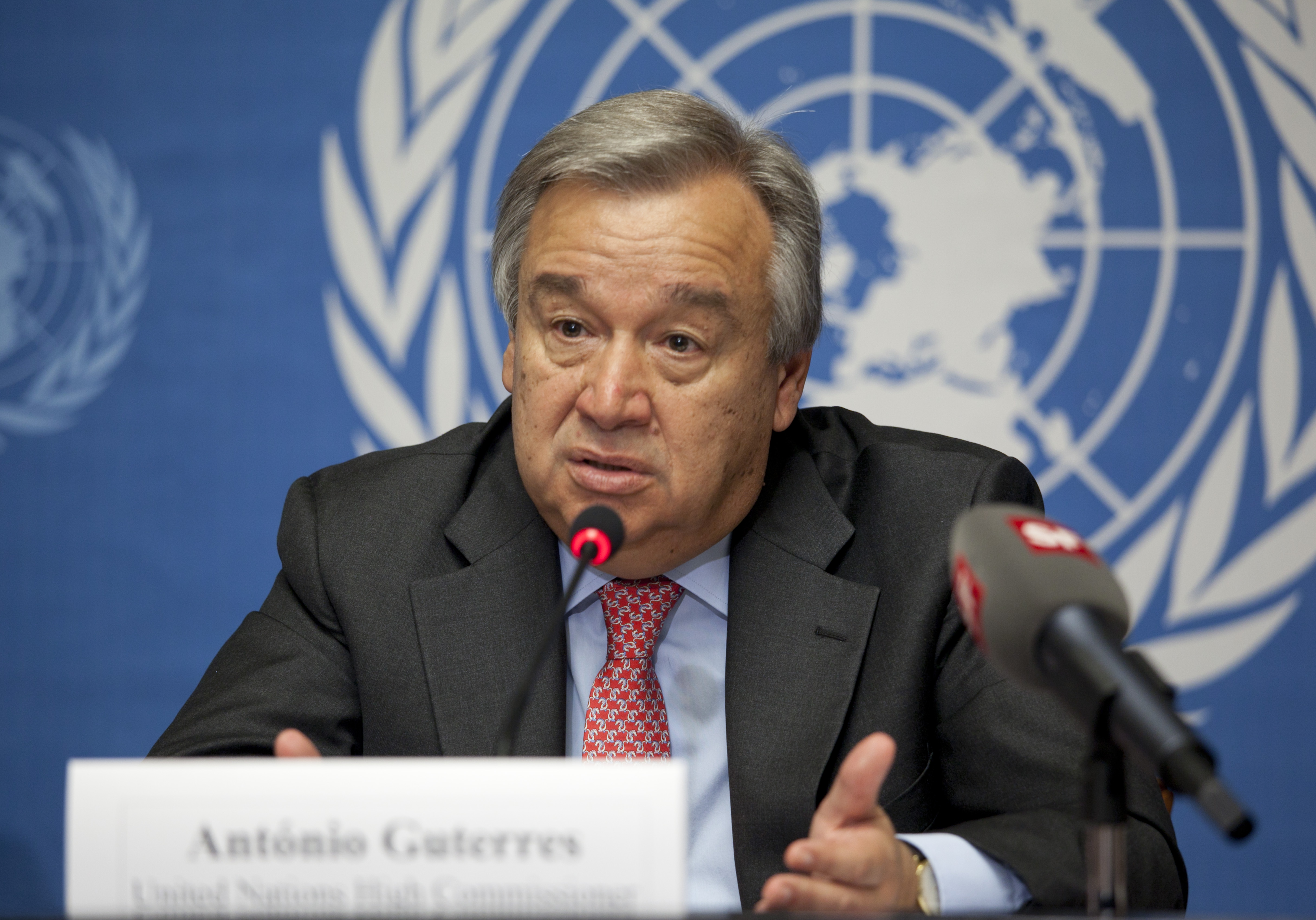
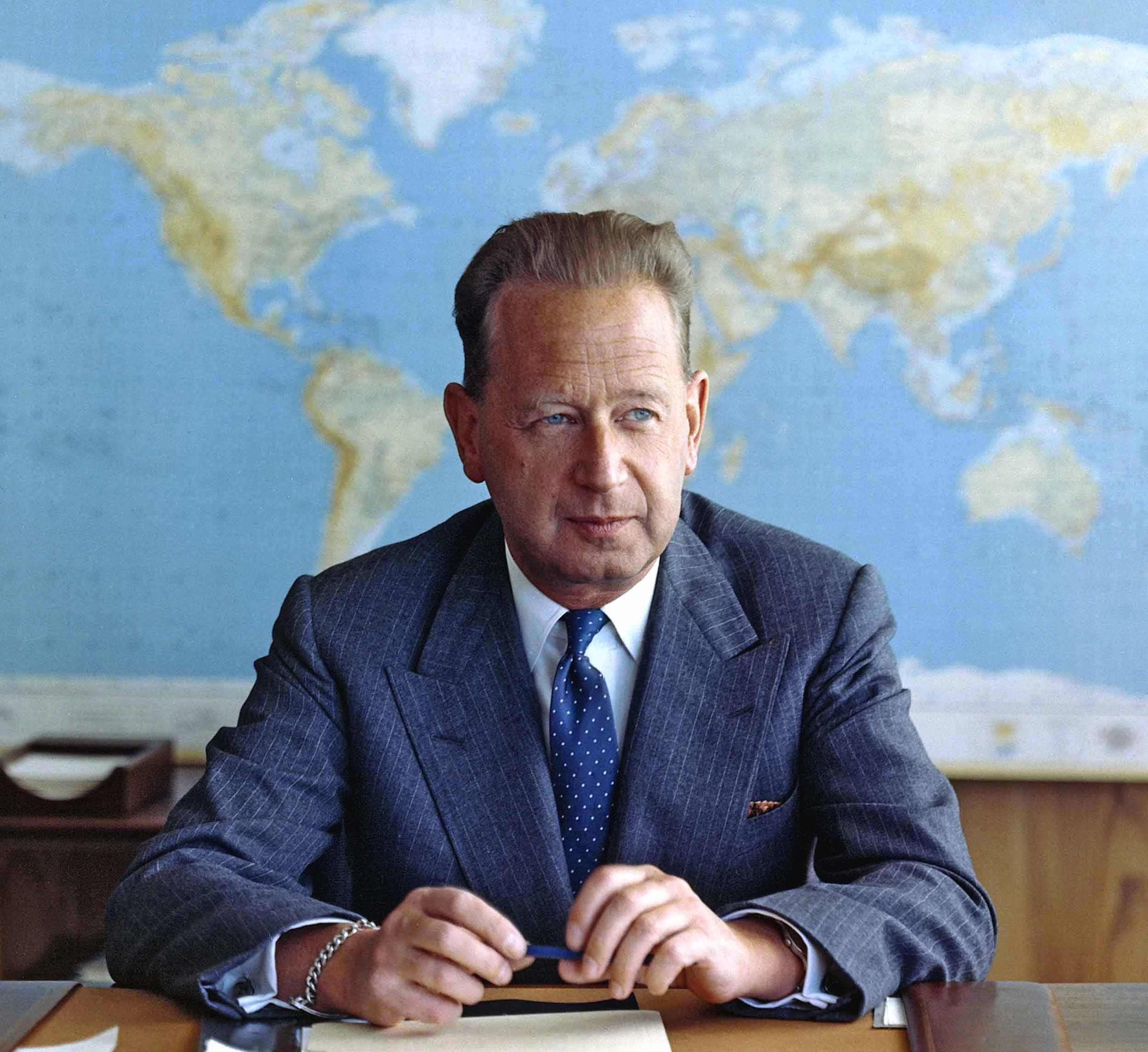
The secretary-general is nominated by the Security Council and appointed by the General Assembly to a five-year term. All five permanent members of the Security Council must agree on a candidate before that person can be nominated. The Security Council then makes a recommendation to the General Assembly. A majority vote of the Assembly appoints a secretary-general. The secretary-general is assisted by a deputy secretary-general.
Nine men have served as secretary-general. Their names, nationalities, and years of service are (1) Trygve Lie of Norway, 1946 to 1953; (2) Dag Hammarskjöld of Sweden, 1953 to 1961; (3) U Thant of Burma (now Myanmar), 1961 to 1971; (4) Kurt Waldheim of Austria, 1972 to 1981; (5) Javier Perez de Cuellar of Peru, 1982 to 1991; (6) Boutros Boutros-Ghali of Egypt, 1992 to 1996; (7) Kofi Annan of Ghana, 1997 to 2006; (8) Ban Ki-moon of South Korea, 2007 to 2016; and (9) António Guterres of Portugal, who became secretary-general in 2017. For more information on these men, see their separate biographies in World Book.
Other employees.
The Secretariat has several thousand employees working at UN Headquarters. Thousands more work at the UN’s European headquarters in Geneva, Switzerland, or in special UN missions and agencies throughout the world.
The secretary-general appoints and organizes the staff of the Secretariat. The charter instructs the secretary-general to choose staff members from as many different member nations as possible. Employees include accountants, economists, lawyers, mathematicians, translators, and writers. Every UN member country may fill at least six Secretariat jobs if it can provide qualified individuals. Employees who work for the Secretariat are not allowed to take orders from any member nation.
Other main organs
The Economic and Social Council.
The United Nations is the first international organization with a major organ devoted to improving the way people live. The Economic and Social Council works to encourage higher standards of living, better health, cultural and educational cooperation among nations, and observance of human rights. It makes recommendations in these areas to the General Assembly, individual nations, and the UN’s specialized agencies. For example, the Council recommends to the General Assembly the economic and social projects it considers worthy of UN support. The Assembly then may grant funds for these projects.
The Economic and Social Council is responsible for working with the specialized agencies. In addition to making recommendations to them, the Council communicates recommendations from the agencies to the General Assembly. The Council also cooperates with more than 100 other organizations throughout the world, including the Red Cross and labor unions.
The Council has 54 member nations. Each year, the General Assembly elects 18 members to serve for three years. The Council meets at least twice a year. Each member has one vote and decisions are made by a simple majority. The Council may allow any UN member or specialized agency to take part in discussions of concern to them. But only Council members may vote.
The Council has a number of commissions that assist it. Some deal with the economic and social issues of specific regions, such as Africa, Asia, Europe, and Latin America. Others deal with such issues as narcotics, criminal justice, technological development, and women’s rights. Other bodies that assist the Council include the governing boards of the United Nations Children’s Fund (UNICEF) and the United Nations Development Programme.
The International Court of Justice
deals with the legal problems of the United Nations. The court has 15 judges, each appointed to a nine-year term. The Security Council and the General Assembly, voting independently, select the judges. No two judges may come from the same country, and the world’s major civilizations and legal traditions must be represented. The court traditionally includes one judge from each of the permanent members of the Security Council. It elects a president and vice president to three-year terms. Headquarters are at The Hague in the Netherlands.
Any UN member may bring a case before the court. The court has helped settle disputes between various countries, including the United Kingdom and Norway, Belgium and the Netherlands, and Honduras and Nicaragua. These disputes have concerned fishing rights and the ownership of border territory. The General Assembly and the Security Council have also permitted nonmember states to have cases heard by the court. An individual cannot bring a case to the court unless his or her government sponsors it.
No nation can be forced to bring its disputes before the International Court of Justice. Many governments have declared that they will seek court rulings in certain types of disputes. The United States and other nations have said they will decide for themselves what cases to bring before the court. Any nation that seeks a ruling from the court must agree to accept the court’s decision. The court makes its decisions by majority vote.
The International Court gives advisory opinions to the General Assembly upon request. The Assembly also has permitted the Security Council, the Economic and Social Council, the Trusteeship Council, and the specialized agencies to request such opinions. See International Court of Justice.
The Trusteeship Council
was designed to help a number of territories that were not self-governing at the end of World War II. The Council suspended its operations in 1994, after the last of the territories gained independence. Nevertheless, the Trusteeship Council still exists under the UN Charter.
Some of the territories the council was designed to help were colonies of Italy and Japan. Others were German colonies that had become mandates of the League of Nations after World War I (see Mandated territory). The UN Charter made the Trusteeship Council responsible for all these territories and for any others that nations might choose to entrust to it. Such areas were called trust territories. The Council worked to help the trust territories become self-governing or independent (see Trust territory).
Specialized agencies
The specialized agencies are self-governing international organizations related to the UN. They deal with such worldwide problems as agriculture, communications, living and working conditions, and health. Some of the agencies are older than the UN itself.
Each agency has its own organization, membership, and rules, and each has signed an agreement with the UN. The agency agrees to consider recommendations made by the UN and to report back on steps it takes to carry them out. The Economic and Social Council has the responsibility of helping the UN and the specialized agencies work together effectively.
Each specialized agency was set up to deal with a problem involving the cooperation of many nations. Some of the agencies were established to deal with problems of transportation or communication between countries. Other agencies were set up to help countries that had suffered greatly as a result of war or that had recently become independent. These agencies may provide loans, educational assistance, or other types of aid. For more information, see the World Book articles on the specialized agencies, which are listed in the table with this article.
The members at work
Delegations.
Each nation has its own rules for appointing delegates to the UN. In the United States, the president nominates the delegates. The nominees are subject to approval by the Senate. In Canada, the prime minister and the Cabinet choose the delegates. The delegation of each country has a head delegate who is that nation’s official representative at the United Nations. Most countries call their head delegate an ambassador.
Most UN members keep a permanent mission of one or more representatives at UN Headquarters. A permanent mission is helpful for taking part in long-term projects and for keeping up with current developments.
Breaking the language barrier.
United Nations delegates speak dozens of languages. But when conducting official business, the UN uses only six languages—Arabic, Chinese, English, French, Russian, and Spanish. Delegates may address the General Assembly in any language if they provide a translation into one of the official languages. Interpreters instantly translate the words into the other official languages. The delegates wear earphones to listen to the translation they choose.
Groups with common interests.
As UN membership has grown, most nations with similar interests have banded together. The African nations have their own group, as do the Arab countries and the Asian lands. Many Latin American nations make up another group. All these groups meet regularly for various reasons—for example, to decide on a plan of action or to agree on candidates in a UN election. Canada and the other members of the Commonwealth of Nations meet together regularly for discussion but seldom vote as a group. A few nations, including Israel and the United States, do not meet or vote regularly with any group.
Publications and information services.
The UN provides information about its work to member nations and to the public. Each major UN organ, as well as many UN agencies, issues documents that give a complete account of its work. These documents give UN members information that helps them carry out their duties. The UN also issues many publications of interest to the public. The UN Chronicle, for example, describes work done by the UN. The UN also maintains a website with information about the organization.
The UN has a Department of Public Information, which is part of the Secretariat. One of its responsibilities is to direct UN information offices in about 50 cities throughout the world. Each office provides information about the UN to people in nearby regions.
Working for progress
An increasingly important goal of the United Nations is to help make the world a better, safer place in which to live. One way the UN works toward this goal is by providing various types of aid for countries and different groups of people. The UN also works for progress in many other fields, including human rights, peaceful uses of nuclear energy, and pollution control.
Economic and technical aid
consists of grants, loans, training programs, and other means of helping nations develop their resources, production, and trade. The UN dedicated the period from 1961 through 1970 as the first United Nations Development Decade. The UN’s goal during this period was to help developing countries increase their national income by 5 percent each year. Developed nations were asked to donate 1 percent of their yearly national income to the program.
The first Development Decade did not meet all its goals, but some progress was made. The International Bank increased the number and size of its loans for the construction of roads, factories, and similar projects. In 1964, the UN held a Conference on Trade and Development (UNCTAD). The main aim of this conference was to encourage international trade, especially between the rich, developed countries and the poor, developing ones.
In 1965, the UN combined its technical aid programs to form the United Nations Development Programme (UNDP). The UNDP helps nations make studies of their unused natural resources so they can find ways to use them. For example, it suggests ways for nations to make their farms, mines, and water resources more productive. It also helps people learn the skills needed to develop their country’s resources. In 1966, the General Assembly set up the United Nations Industrial Development Organization (UNIDO) to encourage industrialization in developing countries (see United Nations Industrial Development Organization (UNIDO)).
Aid to refugees.
The United Nations aids refugees by protecting their legal rights, providing them with food and shelter, and finding them new homes. The UN has declared that the legal rights of refugees include the right to a job, to an education, and to freedom of religion. During World War II, 44 governments cooperated in setting up the United Nations Relief and Rehabilitation Administration (UNRRA) to conduct war relief. After the UN was created, UNRRA was replaced by the International Refugee Organization (IRO), a specialized agency. By 1951, the worst of the problems caused by the war were over and the IRO was discontinued.
In 1951, the General Assembly set up the Office of the United Nations High Commissioner for Refugees. This agency has assisted refugees from many countries. The main duty of the High Commissioner is to protect the rights of refugees in foreign countries. The Office of the High Commissioner has a small fund raised by voluntary contributions. But in general, it must work through governments and private agencies. See United Nations High Commissioner for Refugees (UNHCR).
The UN has a special agency to assist Palestinian refugees—the United Nations Relief and Works Agency for Palestine Refugees in the Near East (UNRWA). The General Assembly set up the agency to help the hundreds of thousands of Palestinians made homeless by the 1948 war between Israel and Arab countries. Today, millions of Palestinian refugees live in the West Bank, the Gaza Strip, Jordan, Lebanon, and Syria. This number includes the original 1948 refugees, refugees of later conflicts, such as the 1967 Arab-Israeli war, and the descendants of these groups of refugees. UNRWA originally provided food, shelters, medical care, and other services. Today, educational programs and health care have become the major focus of UNRWA’s work.
Aid to children.
The General Assembly established the United Nations Children’s Fund (UNICEF) in 1946. UNICEF’s job was to provide clothing, food, and medical supplies for child victims of World War II. The emergency caused by the war ended by the early 1950’s, but UNICEF had become so popular that the General Assembly made it a permanent organization in 1953. Today, UNICEF provides aid for child development and care, family planning, and job training. In 1989, UNICEF set up the Convention on the Rights of the Child, which seeks special protection for children throughout the world. 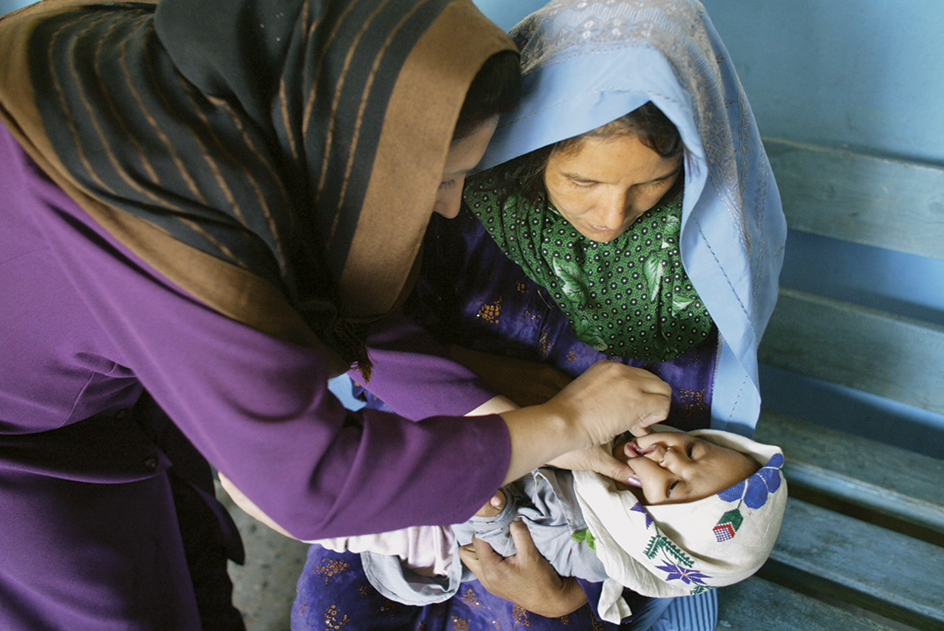
UNICEF’s funds come from voluntary contributions. About three-fourths of its funds are donated by governments. The rest is raised privately. The United States Committee for UNICEF raises several million dollars yearly from Halloween trick-or-treat collections and from the sale of UNICEF greeting cards. See UNICEF.
Human rights.
Loading the player...
Eleanor Roosevelt on human rights
In 1946, the United Nations set up the Commission on Human Rights as part of the Economic and Social Council. The commission wrote the Universal Declaration of Human Rights, which all members of the General Assembly approved in 1948. This declaration expressed the hope that people would learn to respect the rights and dignity of others. See Human Rights, Universal Declaration of.
Racial discrimination is one problem that has frequently been brought before the UN. In 1965, the General Assembly approved a treaty called the International Convention on the Elimination of All Forms of Racial Discrimination. The treaty went into effect in 1969, after the governments of 27 nations had approved it. Similar UN treaties deal with slavery, the rights of refugees, and the crime of genocide (extermination of an entire national, racial, or religious group).
In 1998, 120 UN member nations approved a treaty calling for the establishment of the International Criminal Court. This court, which is not part of the UN system, is designed to prosecute genocide, war crimes, and crimes against humanity. The court began operations in 2003. In 2006, the General Assembly voted to eliminate the Commission on Human Rights and replace it with a new Human Rights Council. The new council meets regularly throughout the year to address human rights issues. See United Nations Human Rights Council
Peaceful uses of nuclear energy.
In 1953, President Dwight D. Eisenhower of the United States suggested that governments contribute nuclear materials to an international agency. This agency would use such materials to help develop peaceful uses of nuclear energy.
In 1957, the UN set up the agency that Eisenhower had suggested. The International Atomic Energy Agency (IAEA) is separate from the UN but works closely with it. Its main responsibility is to encourage peaceful uses of nuclear energy. The agency also tries to make sure that no nuclear materials held or supplied by its member nations are used for making weapons. It has placed controls on its members’ nuclear materials and conducts inspections of nuclear facilities in many countries each year. A treaty prohibiting the spread of nuclear weapons took effect in 1970. The IAEA is responsible for inspections that make sure the treaty is not broken. These inspections can sometimes be problematic. In 2005, the IAEA began inspecting and reporting on nuclear facilities in Iran in an attempt to prevent Iran from acquiring nuclear weapons. Nearly a decade later, the issue was no closer to being resolved.
The IAEA cooperates with many other agencies to encourage the sharing of nuclear information. It also encourages research and experiments dealing with nuclear fuels, nuclear medicine, desalination (removing the salt) of seawater, and other uses of nuclear energy. Money for IAEA projects comes from dues paid by member nations and from voluntary contributions. See International Atomic Energy Agency (IAEA).
Controlling the environment.
The United Nations, like many other organizations, has called attention to air and water pollution and other dangers that threaten the environment. In 1968, the General Assembly passed a resolution pledging the UN to work for solutions to problems concerning the environment.
The UN Conference on Human Environment met in 1972 to discuss ways in which UN members could cooperate with one another to protect the environment. As a result of the conference, the General Assembly established the United Nations Environment Programme in 1972. The program encourages international cooperation to fight pollution and preserve the earth’s natural resources. In 1992, representatives of UN member nations met in Rio de Janeiro, Brazil, for the United Nations Conference on Environment and Development. At this conference, also known as the Earth Summit, UN members signed agreements on the prevention of global warming, the preservation of forests and endangered species, and other issues. In 2002, representatives met again, at the UN’s World Summit on Sustainable Development in Johannesburg, South Africa. The group held another summit in Rio de Janeiro in 2012.
Fighting hunger
has always been a major goal of the UN. The Food and Agriculture Organization of the United Nations (FAO), a specialized agency, was established in 1945. The agency works to improve the production and distribution of food and other agricultural products. The World Food Programme began in 1962 as a joint project of the UN and FAO. It provides emergency food aid and other assistance to developing countries. Food and Agriculture Organization (FAO).
In the 1970’s, the production of food in many countries fell behind population growth. As a result, large numbers of people suffered from severe malnutrition. In 1974, the UN World Food Conference met in Rome to discuss the food shortage. The conference set up a new UN agency, the World Food Council. The council coordinates the delivery of food to less developed nations. It also accumulates world food reserves for use in time of famine. The council works through the FAO, the United Nations Development Programme (UNDP), UNICEF, and other agencies. The Rome conference also created an international warning system to detect future shortages.
In some cases, the UN has delivered food and medicine to war-torn countries to relieve civilians of shortages. It has also sent peacekeeping troops to protect such deliveries.
Because the FAO is concerned with livestock animals, some of its work involves veterinary research. The FAO closely monitors avian influenza (bird flu) to attempt to stop the spread of the disease. This disease is fatal to such domestic birds as chickens, ducks, and turkeys. In 2011, the FAO and the UN’s World Organization for Animal Health announced that a fatal disease of cattle, rinderpest, had been eliminated.
Disaster relief.
The UN works to help communities prepare for and recover from earthquakes, floods, landslides, and other natural disasters. The organization seeks to prevent injury, sickness, and loss of life; minimize environmental damage; and address economic concerns relating to destructive events. Most of the UN’s efforts for disaster relief are headed by the Office for the Coordination of Humanitarian Affairs (OCHA), which was formed in 1998.
In late 2004, a series of large ocean waves called a tsunami caused massive destruction in many coastal areas of Asia and Africa bordering the Indian Ocean. About 228,000 people were killed. Millions more were left homeless. Following the disaster, the UN began coordinating widespread relief and reconstruction efforts in the region. After Hurricane Katrina struck the United States Gulf Coast in 2005, UN agencies provided support to victims in the region. Many UN agencies responded to the earthquake and tsunami that struck Japan in 2011, killing nearly 16,000 people. The disaster also caused emergencies at several nuclear power plants.
Working for peace and security
The most important goals of the United Nations include achieving world peace and security. The UN has helped end a number of conflicts around the world through the negotiation of cease-fires and peace agreements. After the fighting stops, the UN may engage in keeping the peace by sending peacekeeping forces to the region. It may also help the warring groups find ways to prevent the fighting from starting again. In addition, the UN may try to restore order to a country in which civil war has broken out. Such action is sometimes called peacemaking instead of peacekeeping. The United Nations also has sought to promote world peace and security by sponsoring arms control agreements and treaties on the peaceful use of outer space and the seabed.
Peacekeeping operations
encourage the peaceful settlement of disputes and try to end fighting throughout the world. There are two types of UN peacekeeping operations—observer missions and peacekeeping forces. The UN Security Council establishes peacekeeping operations, defines their mission, and dispatches the observer mission or peacekeeping force to the problem region. Any of the five permanent Security Council members—China, France, Russia, the United Kingdom, and the United States—can veto any decision on peacekeeping operations. 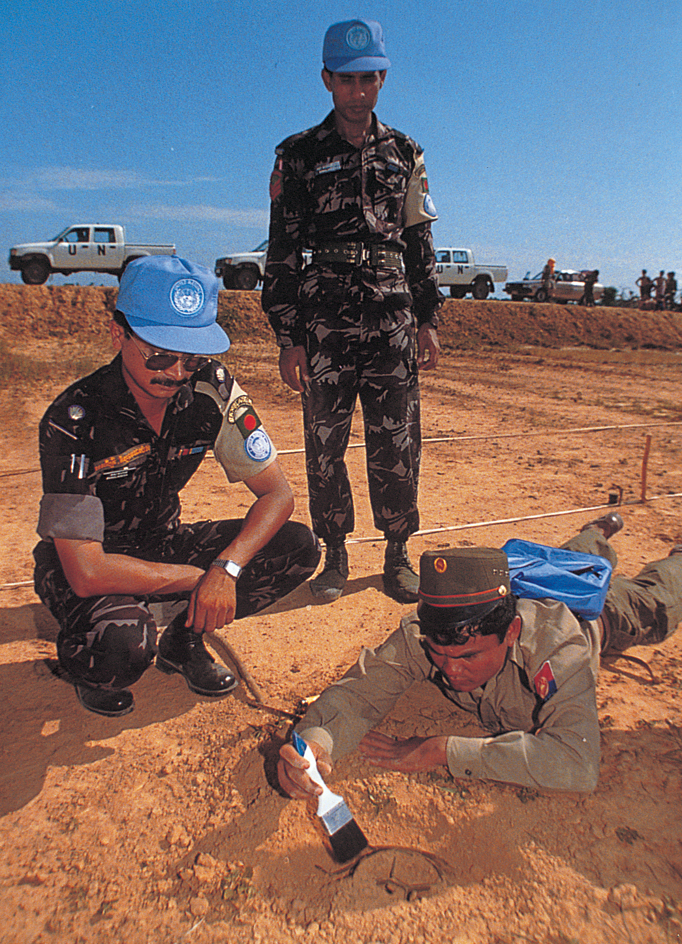
Observer missions consist of a group of military officers, usually unarmed. The UN sends such a mission to monitor an international situation that threatens the peace. The observers’ functions may be to watch and report to the United Nations on the maintenance of a cease-fire, to investigate reported violations of an international agreement, or to do whatever they can to ease friction in a tense situation.
Peacekeeping forces consist of lightly armed troops. The UN sends such forces to deal with an international dispute if both sides in the conflict agree to have them come. The UN may also send peacekeepers if such action seems to be the only way to end hostilities. UN peacekeepers may create and patrol buffer zones between opposing forces, encourage peace negotiations, monitor cease-fire agreements, or help enforce peace treaties. 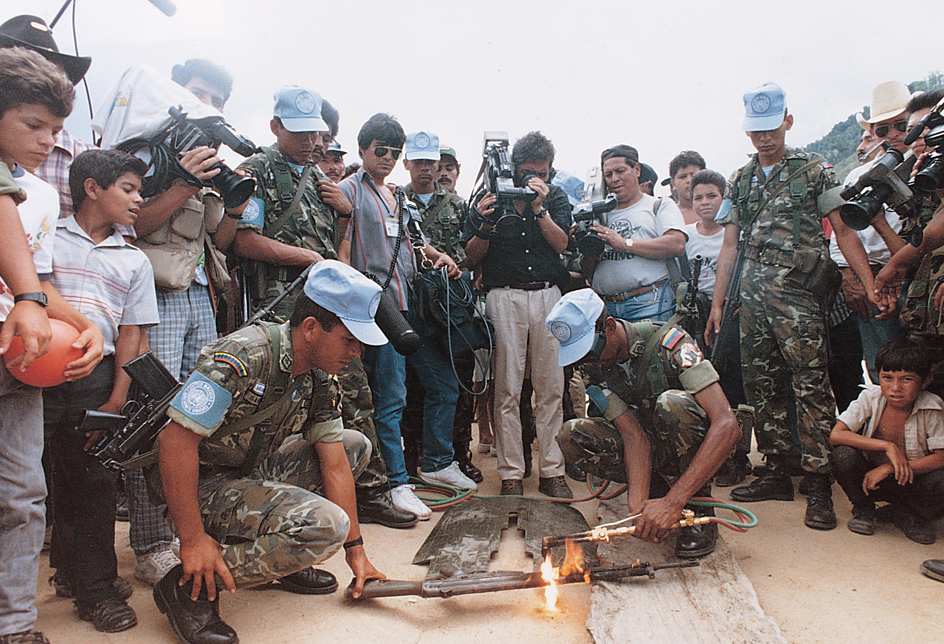
Because the UN has no army, UN member nations voluntarily provide troops and equipment for each peacekeeping force. Canada and the small island nation of Fiji have taken part in almost every peacekeeping operation since the UN was founded. Other leading contributors of troops include Bangladesh, Brazil, India, and Pakistan.
Peacekeeping soldiers wear their own national uniforms. To identify them as UN peacekeepers, they also wear blue hats or blue helmets and the UN insignia. Peacekeepers are permitted to use their weapons only for self-defense. They are required to remain completely impartial at all times and to avoid any action that might affect the claims or the positions of the parties in a dispute.
The first UN peacekeeping operation was an observer mission called the United Nations Truce Supervision Organization (UNTSO). The mission was established in 1948 to supervise a truce between Arab countries and Israel in the first Arab-Israeli war. UNTSO’s activities have changed over the years, but it remains in the Middle East, where it works to keep the peace.
The first UN peacekeeping force was established in 1956 during a dispute over the Suez Canal. Fighting had broken out after Egypt blocked Israeli ships from the canal and then seized the canal from its British and French owners. Israel, the United Kingdom, and France attacked Egypt in response. The UN arranged a cease-fire and sent a peacekeeping force called the United Nations Emergency Force (UNEF) to guard the borders between Egypt and Israel. The UNEF completed its mission in 1967, but conflict between Arabs and Israelis continued. A number of wars have since broken out between the two sides.
Over the years, the UN has helped arrange several cease-fires to stop the fighting in the Middle East. The organization has also sent other peacekeeping forces to the Middle East and other parts of the world. For example, the UN Disengagement Observer Force has supervised Syrian and Israeli troops in a disputed area called the Golan Heights since 1974. The UN Interim Force in Lebanon has served in that country since 1978. The Interim Force helped end fighting between Israel and Lebanon in 2006. A United Nations peacekeeping force has sought to reduce hostilities between government and rebel groups in the Democratic Republic of the Congo since 1999. Some of the UN’s more complex peacekeeping missions in the 2000’s have been in Sudan, especially in its western region of Darfur, and in Syria.
In 1988, UN peacekeeping forces were awarded the Nobel Peace Prize for helping control military conflict in the Middle East and other areas. The UN won the Nobel Peace Prize again in 2001 for its continued efforts to build peace and security. For more information, see Arab-Israeli conflict; Middle East (The Palestine conflict).
Military actions.
The UN has used force to punish aggression in two major international conflicts, the Korean War and the Persian Gulf War of 1991.
The Korean War
(1950-1953) marked the first time a world organization ever took part in fighting a war. In this conflict, UN troops prevented Communist armies of North Korea from taking over South Korea.
The war grew out of the Cold War tensions that existed between Communist countries and non-Communist countries. At the end of World War II in 1945, Communist troops from the Soviet Union occupied Korea north of the 38th parallel, and United States troops occupied it to the south. In 1947, the UN appointed a commission to find ways to unite the country and form a national government. The northern part of Korea refused to take part in this plan. But elections were held in the southern part, and the Republic of Korea was set up there. In 1948, the General Assembly declared that the government of the Republic of Korea (South Korea) was the only legal government in Korea.
On June 25, 1950, troops from Communist-ruled North Korea invaded South Korea. The UN called the invasion a violation of international peace and demanded that the Communists withdraw from South Korea. The Security Council agreed on what it called a “police action.” It voted to ask members of the UN to send troops to assist South Korea. The Soviet Union could not veto the Council’s action because it had temporarily withdrawn its delegate to protest Nationalist China’s membership on the Council.
On July 7, 1950, the Council formed a UN military command under the leadership of the United States. Of the 60 UN members, 16 sent troops to Korea and 41 sent supplies. But the United States contributed about 90 percent of all the troops and supplies. In October 1950, Chinese Communist forces entered the war. The Security Council met to discuss the situation, but the Soviet delegate had returned and vetoed any attempt of the Council to act. The war ended on July 27, 1953, when North Korea and the UN signed a cease-fire agreement. By then, the Communist troops had been expelled from almost all of the area south of the 38th parallel. See Korean War.
The Persian Gulf War of 1991.
In 1991, a military coalition of UN members expelled Iraq from Kuwait, an oil-rich country on Iraq’s southern border. Iraq had invaded and occupied Kuwait in August 1990. The economies of many Western countries depended on oil from Kuwait and from neighboring Saudi Arabia, which many Westerners feared Iraq would invade next.
Soon after Iraq invaded Kuwait, the UN Security Council demanded that Iraq withdraw its forces. The Council also called on all countries to end their trade with Iraq until Iraq withdrew from Kuwait. As a result, trade with Iraq declined sharply.
In November 1990, the Security Council authorized UN member nations to “use all necessary means” to expel Iraq from Kuwait if Iraq did not withdraw by Jan. 15, 1991. Iraq did not remove its armed forces by this deadline. On January 17, air forces of UN members started bombing Iraqi military targets in Iraq and Kuwait. UN members that sent troops included the United States, Canada, and several Western European and Arab countries. Ground forces invaded Kuwait and Iraq on February 24. On February 28, all military operations ended. On April 6, Iraq agreed to comply with UN resolutions. See Persian Gulf War of 1991 .
The end of the Cold War.
From the late 1940’s to the 1980’s, many UN efforts to achieve world peace focused on easing Cold War tensions. The Cold War was a struggle for international power between Communist nations, led by the Soviet Union, and non-Communist nations, led by the United States. The Korean War, for example, resulted largely from Cold War friction.
In the late 1980’s and early 1990’s, several Communist governments in Eastern Europe collapsed because the Soviet Union did not use its military forces to back them up. The Soviet Union then broke apart, and the Cold War ended. As a result, the UN shifted much of its attention to other international conflicts. The ending of Cold War tensions also led to greater cooperation among UN member nations and enabled the UN to expand its peacekeeping operations. In the 1990’s, for example, UN peacekeeping forces supervised elections in many parts of the world, including Cambodia, Eritrea, Namibia, and Nicaragua. They also distributed food and other humanitarian aid in Bosnia, Rwanda, and Somalia. In the early 2000’s, about 15 peacekeeping operations remained active, most of them in the Middle East, Africa, and Europe.
Arms control.
The UN Charter mentions only briefly the need for arms control. But the charter was written before the nuclear age began. By 1949, both the Soviet Union and the United States had atomic bombs. They agreed that controls were needed for such weapons but could not agree on what kind. The UN studied the problem, and the General Assembly issued many appeals for nations to reduce their arms production. 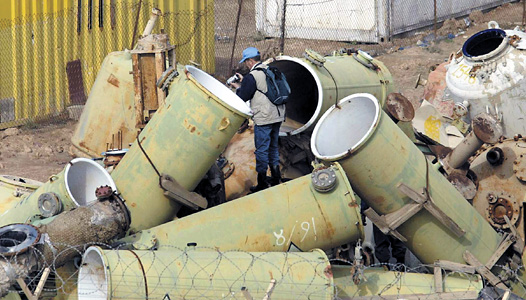
In 1961, the Soviet Union and the United States agreed on a plan to establish a disarmament committee. The UN approved the plan, and an 18-nation committee was set up. More nations were added in 1969. In 1979, the number was increased to 40, and the Committee on Disarmament became an official UN organ.
The Cuban missile crisis of 1962 persuaded both the Soviet Union and the United States to work harder for control of nuclear weapons. During that crisis, the world had stood on the brink of nuclear war (see Cuban missile crisis). In 1963, three nations with nuclear weapons—the Soviet Union, the United States, and the United Kingdom—along with most other UN members, signed a treaty outlawing nuclear tests in the atmosphere, in outer space, and underwater—but not underground. The Soviet Union, the United States, and the United Kingdom also agreed not to put such weapons in orbit.
In 1968, the UN approved a nonproliferation treaty. This treaty prohibits the nuclear powers that signed and ratified (formally approved) it—originally the United Kingdom, the Soviet Union, and the United States—from giving nuclear weapons to nations that do not already have them. The treaty went into effect in 1970. China and France signed the treaty in 1992. After the Soviet Union was dissolved in 1991, the former Soviet republics with nuclear weapons signed the treaty—Russia in 1992, Belarus and Kazakhstan in 1993, and Ukraine in 1994. In 1971, the General Assembly approved a treaty banning the production and stockpiling of biological weapons. The treaty took effect in 1975. In 1993, more than 120 countries signed a UN-sponsored treaty banning the manufacture, use, transfer, and stockpiling of chemical weapons. The treaty went into effect in 1997. See Nuclear Nonproliferation Treaty.
In 1996, the UN approved the Comprehensive Nuclear-Test-Ban Treaty, designed to end the testing of nuclear weapons. To officially go into effect, the pact must be ratified by the legislatures of all countries that have nuclear reactors (devices for producing nuclear energy). Three of these countries—India, Pakistan, and North Korea—have not signed or ratified the treaty. Several others, including the United States and Russia, have not ratified the treaty or have revoked their earlier ratification of it. However, all countries that have signed the pact are expected to abide by it, even if it does not formally go into effect.
In the years following the Persian Gulf War of 1991, the UN sent teams of inspectors to Iraq to investigate suspected weapons sites. The searches were aimed at ensuring that Iraq did not possess weapons of mass destruction—that is, biological, chemical, or nuclear weapons. The UN inspectors left Iraq in 1998, after the Iraqi government had failed to cooperate with the inspectors. In 2002, the UN Security Council passed a resolution calling for the return of weapons inspectors to Iraq. The inspectors returned to Iraq later that year. However, they left in early 2003, when the United States and its allies began military action to disarm Iraq. See Iraq War.
Fighting terrorism.
In September 2001, the Security Council adopted a resolution requiring all member nations to take steps against international terrorism. The resolution ordered nations to restrict the funding, training, and movement of terrorists and to cooperate with one another in antiterrorist campaigns and investigations. Both the Security Council and the General Assembly stressed that governments that sponsor, assist, or protect terrorist groups will be punished. The UN’s actions came in response to terrorist attacks on the World Trade Center in New York City and on the Pentagon Building near Washington, D.C., earlier that month.
Other UN efforts to fight terrorism have included the 1963 Convention on Offences and Certain Other Acts Committed on Board Aircraft, the 1997 International Convention for the Suppression of Terrorist Bombings, and the 1999 International Convention for the Suppression of the Financing of Terrorism.
The UN itself has at times been the target of terrorist violence. Numerous civilian staff members and officials have been killed or taken hostage in the line of work. In 2003, a terrorist bombing killed 22 people, including a senior UN official, at a UN facility in Baghdad, Iraq. Another terrorist bombing in Algiers in 2007 killed 17 UN staff members.
Peaceful uses of outer space and the seabed.
In 1958, the UN secretary-general asked all nations to agree not to claim territory in outer space. The General Assembly stated in 1963 that outer space should benefit all people and no nation could claim any of it. In 1967, over 90 countries signed a treaty reflecting these aims.
The question of uses of the seabed came before the General Assembly for the first time in 1967. The Assembly noted that new inventions allowed nations to use the seabed as a source of valuable minerals and in other new ways. The Assembly appointed a permanent 42-nation committee to study the problem. The committee agreed that a large area of the seabed should be beyond the control of individual nations and should be used only for the benefit of all people. In 1971, the UN created a treaty barring the testing or use of nuclear weapons from the seabed beyond a 12-nautical-mile coastal zone. The treaty took effect in 1972. In 1982, a UN conference adopted the Law of the Sea Treaty Convention, a treaty that covered many uses of the ocean. The pact took effect in 1994.
Working for self-government
Another major goal of the United Nations is to help peoples and territories gain self-government and independence from colonial rule. The organization also works to assist former territories in the development of free political institutions.
After World War II ended in 1945, the European nations that controlled most colonies in Africa and Asia lacked the resources to continue ruling their colonies. Demands for self-government had been growing among colonial peoples, and many people throughout the world had come to oppose colonialism as unjust. In 1960, the UN General Assembly adopted a resolution called the Declaration on the Granting of Independence to Colonial Countries and Peoples. The resolution declared that “immediate steps shall be taken … to transfer all powers” to the peoples in colonies “to enable them to enjoy complete independence and freedom.”
From 1950 to 1980, more than 45 African colonies gained their freedom. Most European colonies in Asia and the Middle East also became self-governing. The formation of so many new nations led to a big increase in the membership of the UN. Seventeen newly independent nations, 16 of them African, joined the UN in 1960, the largest increase in UN membership in any single year.
Much of the work of ending colonial rule was carried out by the UN Trusteeship Council. From 1945 to 1994, the Trusteeship Council helped 11 territories gain self-government, either as independent nations or by voluntarily becoming part of an independent nation. The council suspended its operations in 1994 after Palau, the last of the territories, became self-governing and joined the United Nations. For more information, see the section United Nations (UN) (The Trusteeship Council) earlier in this article.
Namibia, the last colony in Africa, gained independence in 1990, ending 75 years of rule by South Africa. The UN’s campaign to secure Namibian independence ranks as the organization’s longest and most extensive effort to free a former colony. In 1966, the General Assembly voted to end South Africa’s administration of Namibia. It called for setting up a UN council to govern Namibia until Namibia was ready for independence. South Africa refused to let the UN council enter Namibia and introduced apartheid there. The South West Africa People’s Organization (SWAPO), a black Namibian political group, tried to persuade South Africa to grant Namibia independence. In the mid-1960’s, it began using guerrilla tactics to further its goal. In 1989, the UN approved a plan calling for Namibia to be given full independence. Later that year, the UN sent a peacekeeping force to the region. South Africa withdrew its troops from Namibia by November 1989. In 1990, Namibia gained independence after holding UN-supervised elections. The UN withdrew its peacekeeping force from Namibia in 1991.
The UN has also worked to establish an independent state for native Palestinians in the region of Palestine. In 1974, the General Assembly adopted a resolution recognizing the right of Palestinians, including those in Israel, to nationhood. In 2012, the General Assembly voted to grant Palestine the status of nonmember observer state of the UN. For more information, see Palestine.
In 1999, the United Nations voted to create an interim administration for East Timor to help the East Timorese people prepare for full independence. The transitional administration provided security, helped develop civil and social services, and coordinated and delivered humanitarian aid. East Timor became independent in 2002. For more information, see East Timor and Timor .
The founding of the UN
Early in World War II, the representatives of nine European governments fled to London. Nazi Germany had conquered much of Europe and had driven these leaders from their homelands. Representatives of the United Kingdom and the Commonwealth nations met in London with leaders of Belgium, Czechoslovakia, France, Greece, Luxembourg, the Netherlands, Norway, Poland, and Yugoslavia. On June 12, 1941, all these nations signed a declaration pledging to work for a free world, where people could live in peace and security. This pledge, usually called the Inter-Allied Declaration, was the first step toward building the UN.
The Atlantic Charter
followed the Inter-Allied Declaration by two months. It was signed by President Franklin D. Roosevelt of the United States and Prime Minister Winston Churchill of the United Kingdom. The Atlantic Charter expressed their hope for a world where all people could live free from fear and need. It also expressed their intention to seek eventual disarmament and economic cooperation. See Atlantic Charter.
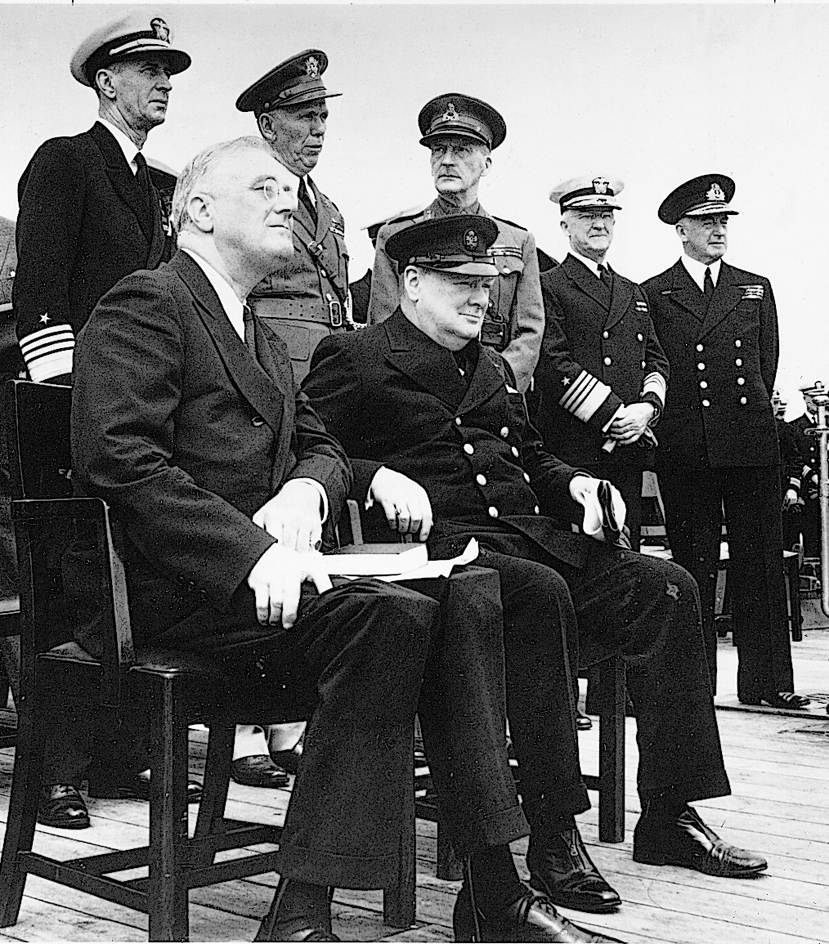
On Jan. 1, 1942, representatives of 26 nations signed the Declaration by United Nations. This was the first official use of the words United Nations. The declaration approved the aims of the Atlantic Charter and was later signed by 21 other nations.
On Oct. 30, 1943, representatives of the United Kingdom, China, the Soviet Union, and the United States signed the Moscow Declaration on General Security. This declaration approved the idea of establishing an international organization for preserving world peace. A month later, Roosevelt, Churchill, and Premier Joseph Stalin of the Soviet Union met at Tehran, Iran. The three men declared that they recognized the responsibility of all the United Nations to achieve lasting peace. See Tehran Conference .
The Dumbarton Oaks Conference.
From August to October 1944, representatives of China, the Soviet Union, the United Kingdom, and the United States held a series of meetings at the Dumbarton Oaks estate in Washington, D.C. The goal of these meetings was to plan a peacekeeping organization. The four nations succeeded in drawing up a basic plan, though they could not agree on some important questions. The plan’s main feature was a Security Council on which the United Kingdom, China, France, the Soviet Union, and the United States would be permanently represented. The issue of voting rights and procedures within the Council remained unsettled, however. See Dumbarton Oaks.
In February 1945, Roosevelt, Churchill, and Stalin met at Yalta in Crimea. At this meeting, they agreed that some minor actions of the Security Council could not be vetoed by the permanent members. The three leaders announced that a conference of United Nations would open in San Francisco on April 25, 1945. This conference would use the plan worked out at the Dumbarton Oaks Conference to help prepare a charter for the UN.
The San Francisco Conference.
Delegates from 50 nations met in San Francisco for the United Nations Conference on International Organization. The conference opened on April 25, 1945, 13 days after the death of Roosevelt and 12 days before the surrender of Germany. Victory over Japan was still four months away.
At the conference, some major disagreements arose between the Big Three (the United Kingdom, the Soviet Union, and the United States) and the smaller, less powerful nations. The Big Three believed they could guarantee future peace only if they continued to cooperate as they had during the war. They insisted that the Charter of the United Nations should give them the power to veto actions of the Security Council. The smaller nations opposed the veto power but could not defeat it. They did succeed in adding to the importance of such UN organs as the General Assembly and the Economic and Social Council. In these bodies, responsibilities could be shared more equally than in the Security Council. Such efforts by smaller nations helped create an organization that had far-reaching powers and responsibilities.
On June 26, 1945, all 50 nations present at the conference voted to accept the charter. Poland had been unable to attend but later signed the charter as an original member. The charter then had to be approved by the governments of the five permanent members of the Security Council and of a majority of the other nations that signed it. It went into effect on Oct. 24, 1945, a date celebrated every year as United Nations Day.
Building UN Headquarters.
The first session of the General Assembly opened in London early in 1946. The delegates took up the question of where the permanent headquarters of the United Nations should be located. They considered invitations from various countries and finally agreed that the headquarters should be in the United States. On Dec. 14, 1946, the Assembly accepted a gift of $81/2 million from John D. Rockefeller, Jr., of the United States to buy 18 acres (7 hectares) of land along the East River in New York City. The city itself donated additional land in the area. In 1947, the General Assembly approved plans for the headquarters buildings. The next year, the U.S. Congress approved an interest-free loan of $65 million for their construction. The buildings were completed in the fall of 1952. 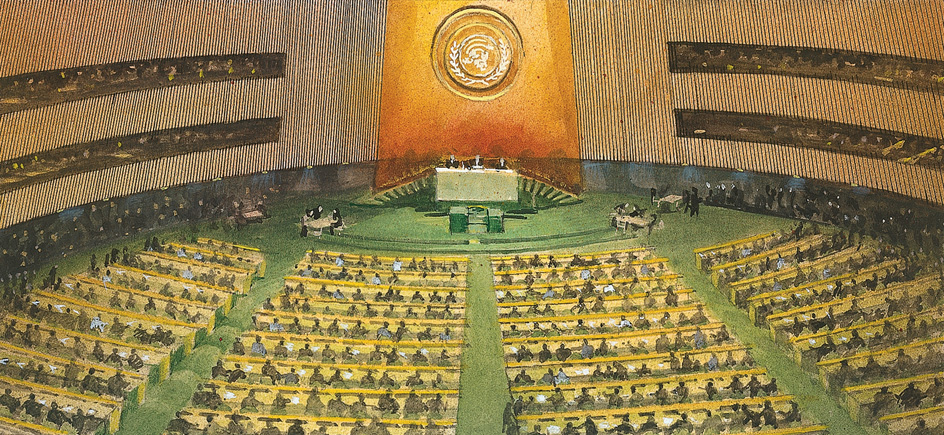
Continuing problems
Finances.
Every UN member must pay a share of the organization’s daily expenses. The amount each member pays depends on its ability to pay. UN rules say that no member can pay more than 25 percent or less than 0.01 percent of the UN’s ordinary expenses. At times, the UN has been weakened by the failure of many of its members to pay their share.
Membership questions.
Most nations are UN members. The question of membership for Communist China came up at every General Assembly session from 1950 to 1971. In 1971, the Assembly voted to expel Nationalist China (Taiwan) and admit Communist China to the UN.
In 1992, the UN suspended Yugoslavia’s participation in the General Assembly and in the Economic and Social Council after most Yugoslav republics had declared their independence. The independent republics were admitted to the UN as separate nations. Under new government, Yugoslavia rejoined the UN in 2000. In 2003, Yugoslavia changed its name to Serbia and Montenegro. In 2006, the two parts of the country—Serbia and Montenegro—separated into independent countries. Serbia retained the existing UN seat. Montenegro gained separate membership. In 2008, Kosovo declared its independence from the nation of Serbia. In that instance, although Kosovo was recognized by many Western nations, it was not recognized as a nation by the UN or given UN membership.
Nations join the UN for various reasons. Membership gives some nations a place in the international community that they might not otherwise have. Some of these nations are so small that they cannot afford their own embassies. Through one mission at the UN, they can keep in contact with most of the world’s governments. Membership in the UN enables these small nations to bring their problems to public attention and to take part in UN programs of economic and technical assistance.
The presence of many small nations in the UN has also created some problems. In the General Assembly, the vote of the smallest state counts the same as the vote of the largest. Some nations have suggested that small countries be given less than a full vote.
Only one nation—Indonesia—has ever withdrawn from the UN. But it rejoined less than two years later. Most nations seem unwilling to try to get along without the UN. They also realize the value of international effort in dealing with certain kinds of economic and social problems. Above all, members understand that UN efforts toward peacekeeping and peacemaking can help prevent a third world war.
Policy disagreements.
In some cases, disagreements among UN members can affect the ability of the organization to work toward peace. In late 2002 and early 2003, members of the UN Security Council debated whether military action was necessary to confront Iraq’s suspected possession of banned weapons. The United States, the United Kingdom, and other countries supported military action, while such countries as France, Germany, and Russia argued for more time to seek a diplomatic solution to the problem. The United Nations and the governments of many countries expressed disappointment that the council was unable to reach an agreement. United States President George W. Bush argued that the Security Council had “not lived up to its responsibilities” in disarming Iraq. The United States and the United Kingdom led a military campaign against Iraq without the backing of the council. See Iraq War.
In 2004, the UN received criticism for its handling of an “oil-for-food” program in Iraq. Under this program, which lasted from 1996 to 2003, money from Iraqi oil sales was to be used, with UN supervision, to buy food and medicine for Iraqi civilians. However, investigations later revealed that Saddam Hussein, then president of Iraq, was able to abuse the program and profit illegally from oil sales. Some critics claimed that several UN officials also abused the program.
The UN struggled to find agreement on environmental issues. In 2007, the Nobel Peace Prize was awarded to the UN’s Intergovernmental Panel on Climate Change (IPCC) and former U.S. Vice President Al Gore, Jr. The IPCC is a United Nations committee that provides scientific information to world governments regarding the impact of human activities on global warming. The Peace Prize recognized the committee’s work in publicizing the causes and dangers of global warming.
But UN protocols (agreements) on the environment and conferences held by such UN groups as the United Nations Framework Convention on Climate Change have also brought the UN criticism. Nearly all climate scientists agree that human activities are the main cause of global warming. However, some people reject these findings. Many critics have accused the UN of being biased in favor of science that supports the claim that human activities are the main cause of global warming. Some critics do not think the UN should address the question at all. At the same time, many scientists and environmentalists have expressed alarm at the lack of progress toward reaching new international treaties intended to reduce global warming. Nevertheless, in 2015, UN Secretary-general Ban Ki-moon secured a landmark international agreement to combat climate change. The Paris Climate Change Agreement seeks to curb global warming by limiting the average rise in global temperature during the 2000’s to well below 3.6 Fahrenheit degrees (2.0 Celsius degrees) and to pursue efforts to limit the temperature increase even more, to 3.5 Fahrenheit degrees (1.9 Celsius degrees). The Paris accord went into force in November 2016, after it was signed and ratified by more than 140 nations.
